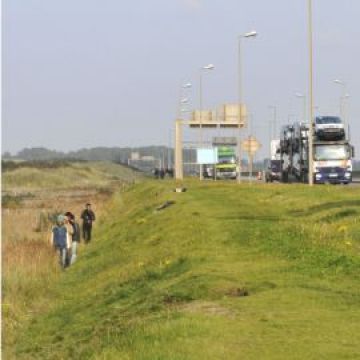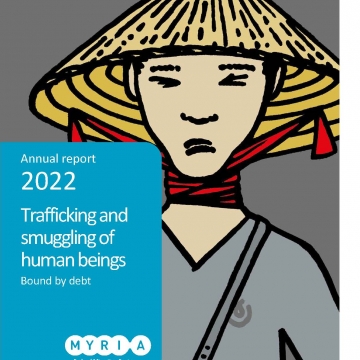Human trafficking ≠ smuggling
Human trafficking is the act of exploiting people for financial gain. It is essentially a form of modern slavery. Exploitation can be sexual – prostitution for example – or economic: construction, hospitality, or the domestic sector. Human trafficking is separate from human smuggling. The latter can be defined as the act of helping people to illegally cross a border for one’s own financial gain.
Both human trafficking and migrant smuggling are punishable in Belgium. This has been the law on human trafficking since 13 April 1995. In 2005 a new law on human trafficking was enacted, prompting Belgium’s new international and European mechanisms that had been established in those years to undergo legislative change and adapt to the new law. As a result, human smuggling and trafficking now have clear definitions.
Defining human trafficking
The new article 433d of the Penal Code defines human trafficking as : the act of recruiting, transporting, transferring, habouring, and accommodating someone, putting them under someone else’s control in order to exploit them.
The operating segments are listed exhaustively:
- prostitution or child pornography exploitation
- exploitation of begging
- degrading working conditions
- organ removal
- forced crime or other offenses (e.g. some types of theft or drug trafficking)
Defining human smuggling
Human smuggling is defined by the new article 77a of the Act of 15 December 1980 on foreigners as: the act of facilitating, in some way or another, be it directly or by an intermediary, the unauthorized entry, transit, or stay of a non-EU citizen into or through a EU member state, in violation of state law, directly or indirectly, for financial gain.

 Publication
Publication
Universal Periodic Review: Parallel report
Parallel report of Myria, Unia and the Combat Poverty, Insecurity and Social Exclusion Service, on the 52nd session of the Universal Periodic Review.
 Publication
Publication
2024 Annual report Trafficking and smuggling of human beings
This annual report, entitled ‘Latin American sex work: a high-risk carousel’, particularly draws attention to the phenomenon of Latin American sex work and calls for the fight against trafficking to be adapted to the new realities of the digital world. These realities are leading to the creation of new, subtle forms of exploitation that require properly adapted investigative resources. Myria is also calling for stronger international collaboration and awareness-raising among the players concerned
_360_360_s_c1.png) Publication
Publication
Gaza Strip: Belgian assistance, evacuations and visa applications
Myria continues to receive reports from Palestinians and Belgians who are deeply concerned about the fate of their relatives trapped in extremely dangerous conditions in Gaza.
 Publication
Publication
2023 Annual report trafficking and smuggling of human beings
Myria is publishing the English version of its 2023 evaluation report, entitled ‘A chain of responsibilities’. With a focus on human trafficking for the purpose of labour exploitation, Myria is calling for more proactive checks and a thorough chain approach.
_360_360_s_c1.png) Publication
Publication
Human rights also apply to single men seeking asylum
8 human rights organisations condemn the decision to temporarily exclude single men from the right to reception within the framework of the asylum procedure.
 Publication
Publication
2022 Annual report trafficking and smuggling of human beings
Myria, the independent national rapporteur on trafficking in human beings, is publishing its 2022 public and independent annual report in English entitled Bound by debt.
